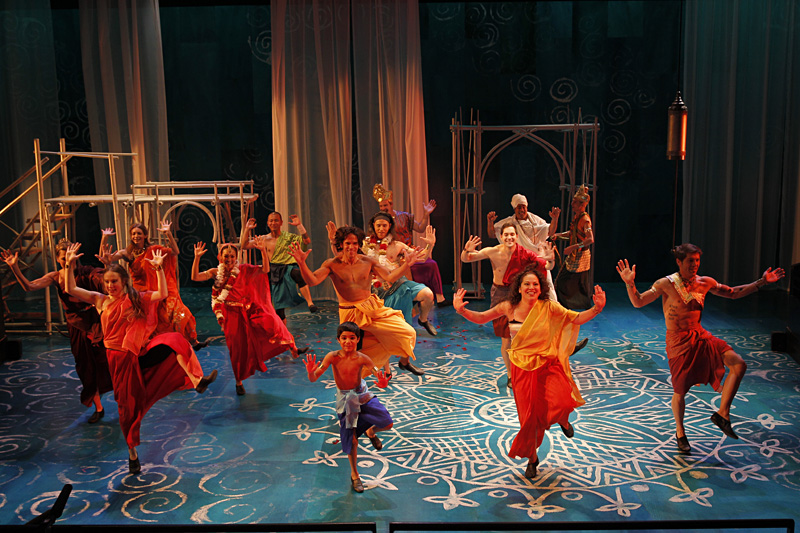Complicated, populous, and whimsical, the Ramayana is one of the two epic literary cornerstones of Hinduism, often compared to the Odyssey and Iliad. ACT’s new attempt to dramatize it for mostly unfamiliar viewers may be variously viewed as exploitative, brave, experimental, condescending, inclusive, reductive, vibrant, or horrifying. The adjectives you choose may depend on your prior knowledge, possibly none, of the fifth-century-B.C. source material. In brief, this adaptation follows demigod Rama and his beloved Sita on their spiritual journey toward dharma (one’s purpose or duty), which can get pretty confusing with battles, betrayals, monkey and bear armies, and shape-shifting.
Presented in English by a predominately Anglo cast, the play’s many vignettes can seem cartoonish. Imagine a well-meaning troupe of Indian actors taking on a quintessential American foundation story like the Revolutionary War, and you see the potential for unintended cultural affront.
In the opening moments, a fragile young boy (Akhi Vadari) sings a mystical song which, though haunting, elicits a vaudevillian shrug from an old sage, Viswamithra (John Farrage). It’s as if the show’s creators were saying, “So much for the ineffable beauty of art—what’s the real story?” Directors Kurt Beattie and Sheila Daniels and playwrights Stephanie Timm and Yussef El Guindi favor a quotidian mood over a sacred one through most of the narrated tale. “Is this thing working?”, Rama’s father Dasaratha (Jim Gall) asks, shaking a mirror in which he doesn’t like the image of himself, after getting sex advice on how to produce heirs.
Yet by seeking neither to offend nor seem too spiritual, the play spends most of its time in a tedious mid-gear of “This happened, then that happened.” Rama (stony Rafael Untalan) meets and wins Sita (Khanh Doan), but then accepts banishment when his father’s youngest wife Kaikeyi (Cheyenne Casebier, wonderfully intense in several roles) demands the throne for her son Bharata (Ray Tagavilla). Off our lovers go, with Rama’s other brother Lakshmana (Tim Gouran), on a journey of dodging temptations (such as Anne Allgood’s hilariously lusty goddess Soorpanaka), getting kidnapped by Soorpanaka’s brother Ravana (Farrage), allying with monkeys Hanuman (Brandon O’Neill) and Sugreeva (Todd Jefferson Moore), and battling jealous gods and animals on Matthew Smucker’s lean sets. It’s a challenge figuring out who’s who before they turn into someone or something else, so keep tabs on the ears, tails, and headdresses designed by Melanie Burgess.
The most intriguing moments occur when the production jumps with both feet into the spiritual. Seeking to lure Rama from Sita, Ravana deploys a magical deer (Belle Wolf) to beguile the couple. Accompanied by Brendan Patrick Hogan’s spirit-pricking music, the deer dances choreography by Maureen Whiting that wordlessly alerts us to what’s at stake in the battle for dharma. Later, her dance through the battlefield feels like a breeze of truth, blowing away the lies mortals tell themselves.
I wish there were more of these universal epiphanies amid the scads of plot. Protracted politicking between rival monkey brothers Vali and Sugreeva is tiring because we don’t know them and don’t care. I didn’t even realize the reason some actors wore black balaclavas was because they’d turned into bears.
As for the play’s unambiguously happy ending, Rama and Sita’s triumphant return to their kingdom, maybe it’s meant as a reward for having sat through three hours of the play (with two intermissions, granted).
This Ramayana gives us big, smiley dance scenes, meticulously choreographed and joyously aerobicized by the unusually buff cast. There are glimpses of divinity here, but also echoes of a Vegas floor show.









